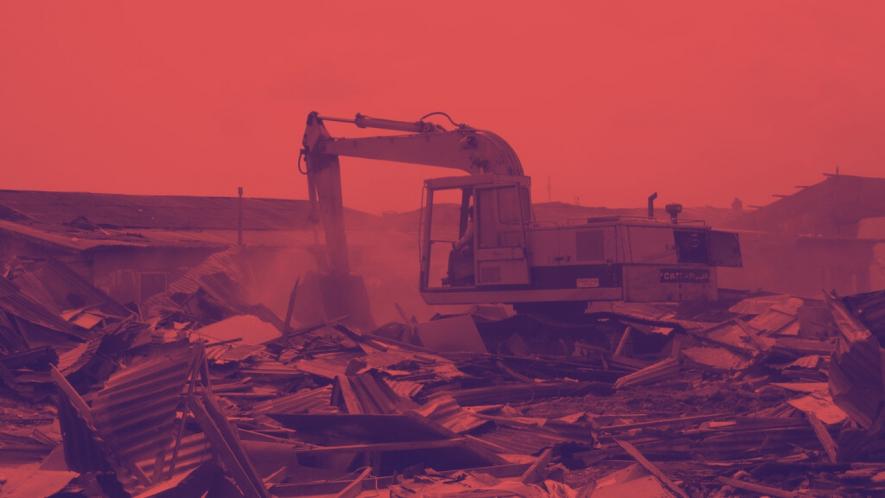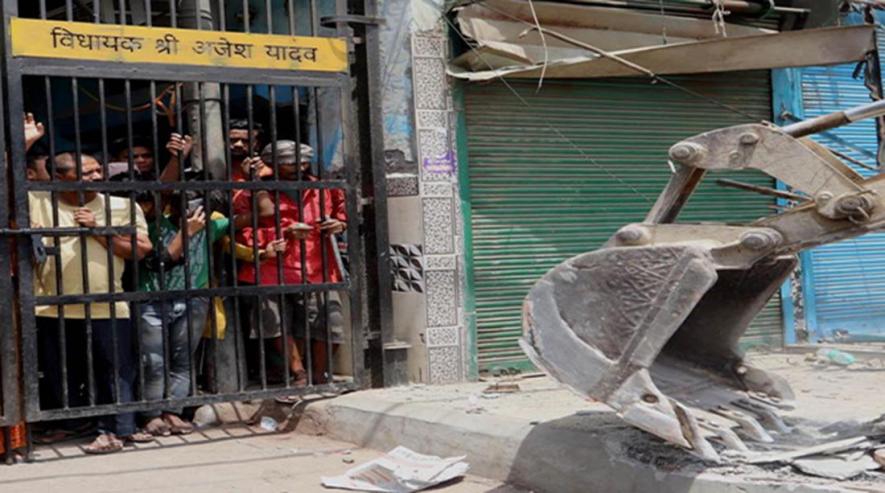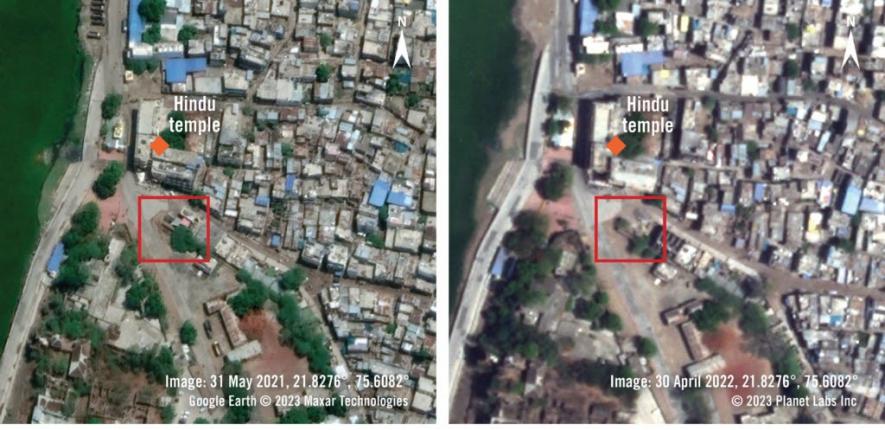INDIA
Demolition of Houses Should be ‘Last Recourse’: MP High Court

Representational image
The Madhya Pradesh High Court, while pulling up the authorities for not following due procedure, awarded a compensation of Rs 1 lakh to the petitioner whose houses were illegally demolished by the Ujjain Municipal Corporation (UMC).
According to a report by Live Law, the court also directed the Commissioner of UMC to take disciplinary action against officials involved in fabricating a panchnama. The petitioners also have been given the option to seek more compensation for their losses through a civil court.
While criticising the UMC authorities for the illegal action, according to Live Law, Justice Vivek Rusia noted in the order: “As observed repeatedly by this court, it has become fashionable now for local administration and local bodies to demolish any house by drawing up proceedings without complying with the Principal of Natural Justice and publish it in the newspaper. It appears that in this case also the criminal case was registered against one of the family members of the petitioners and demolition activities were carried out.”
The court highlighted that while no one has the right to construct a house without proper permission or without adhering to the regulations, demolition should be considered a “last resort”. It emphasised that the opportunity to avail the fair chance to rectify the situation by obtaining regularisation should precede the demolition action.
The Order was delivered by the Indore Bench of the High Court after one Radha Langri petitioned the court after her houses (466 and 467) were demolished without compensation by the Municipal Corporation. According to the report, UMC argued that the demolitions were justified due to unauthorised construction under the Municipal Corporation Act. However, discrepancies emerged regarding ownership claims. The UMC stated one house was owned by Parvez Khan, not Radha, and the other was registered under one Uma. Yet, the Court found inconsistencies, such as ownership attributed to Parvez Khan despite official records indicating that the owner of house no. 466 was listed as Raisa Bi in the official records. The Court then questioned why the panchnama carried false information and a notice was not served to the rightful owner of the house.
According to the report, the Court noted, "Had the Building Officer gone to the spot he would have been informed about the name of the petitioner about the ownership. There is no such person in the name of Parvez Khan, there is no such document to show that he purchased the property only, on the basis of this so-called oral information the panchnama was drawn and drastic action for demolition has been taken."
Bulldozer Demolitions as Retributive State Policy Used Against Muslims in India: Amnesty

Image: Amnesty Report
Indian authorities, government and local administrations, especially in BJP rules states need to immediately stop their unjust and mala fide selective demolitions of Muslim homes and establishments said Amnesty International in two reports released late on Wednesday, February 7.
A unique and intimidatory JCB brand machinery weaponised as a tool in hate campaign against minorities in India with the chief minister of Uttar Pradesh (UP) Yogi Adityanath aka Ajay Bisht even proudly claiming the epithet “Bulldozer Baba” in the run up to his successful second win to power in the state in 2022. Madhya Pradesh (MP), another BJP-ruled state, Gujarat too, and more recently even Maharashtra have seen such demolitions targeted on minority areas. This widespread unlawful demolitions of Muslims’ homes, businesses and places of worship through the use of JCB bulldozers and other machines must stop immediately, Amnesty International said in two companion reports released yesterday.
Both reports — ‘If you speak up, your house will be demolished’: Bulldozer Injustice in India’ and ‘Unearthing Accountability: JCB’s Role and Responsibility in Bulldozer Injustice in India’ — document in detail the punitive demolition of Muslim properties in at least five states with a widespread use of JCB-branded bulldozers or diggers as brand of choice in a hate campaign against the minority community. These demolitions are carried out with widespread impunity as was evident from the Mira Road demolitions after a Ram Temple Rally turned violent earlier last month in Mumbai, India.
Hence, the international human rights body, Amnesty International has called on the Government of India and state governments to immediately halt the de facto policy of demolishing people’s homes as a form of extra-judicial punishment and ensure nobody is made homeless as a result of forced evictions. They must also offer adequate compensation to all those affected by the demolitions and ensure those responsible for these violations are held to account.
“The unlawful demolition of Muslim properties by the Indian authorities, peddled as ‘bulldozer justice’ by political leaders and media, is cruel and appalling. Such displacement and dispossession is deeply unjust, unlawful and discriminatory. They are destroying families— and must stop immediately,” said Agnès Callamard, Amnesty International’s Secretary General.
“The authorities have repeatedly undermined the rule of law, destroying homes, businesses or places of worship, through targeted campaigns of hate, harassment, violence and the weaponization of JCB bulldozers. These human rights abuses must be urgently addressed.”
JCB Bulldozers – ‘Brand of choice’
Amnesty International’s Crisis Evidence Lab and Digital Verification Corps have verified that JCB’s machines, while not the only vehicles used, were the most widely deployed equipment in these demolitions. Their repeated use has given rise to the use of monikers for the company like ‘Jihadi Control Board’ by celebratory right-wing media and politicians.
In response to a letter from Amnesty International, a JCB spokesperson said that once products have been sold to customers, the company has no control over or responsibility for their products’ use or abuse.
Quoting from the UN Guiding Principles on Business and Human Rights, JCB has a responsibility to respect human rights including by conducting due diligence to identify, prevent and mitigate adverse human rights impacts that are directly linked to its operations, products or services across its value chain. This requirement is especially important when a company’s products are used in regions where there is a heightened risk or evidence of their link to human rights abuses publicly available, such as in Assam, Delhi, Gujarat, Uttar Pradesh and Madhya Pradesh.
“Under international standards, JCB is responsible for what third-party buyers do with its equipment. The company must stop looking away as JCB machines are used to target and punish the Muslim community, while people sloganeer anti-Muslim vitriol mounted from atop these bulldozers. JCB cannot continue to evade responsibility while its machines are repeatedly used to inflict human rights abuses,” said Agnès Callamard.
“The company must publicly condemn the use of its machinery to commit human rights violations, including punitive demolitions of Muslim properties in India, use its leverage to mitigate adverse impact and create robust human rights due diligence policies for the use of its equipment across the globe.”
Is this a ‘Punishment’ for religious minorities, asks Amnesty
Between April and June 2022, Amnesty International researchers found that authorities in five states – Bhartiya Janata Party (BJP)-ruled states of Assam, Gujarat, Madhya Pradesh, and Uttar Pradesh and the Aam Aadmi Party (AAP) governed state of Delhi – carried out demolitions as a ‘punishment’ following episodes of communal violence or protests against discrimination by those in authority against Muslims.
Amnesty International investigated 63 of 128 documented demolitions in detail by interviewing more than a hundred survivors, legal experts, journalists and community leaders. At least 33 instances of the repeated use of JCB’s equipment were verified. The investigation also established that at least 617 people, including men, women, children and older persons, were rendered homeless or deprived of their livelihoods. These individuals were subjected to forced evictions, intimidation and unlawful force by the police and collective and arbitrary punishment, which undermined their rights to non-discrimination, adequate housing, and a fair trial.
An abject failure to follow due process
“The (bulldozers) directly attacked our house. We weren’t given any notice. Nothing,” said Hasina Bi, a 56-year-old widow who was at her home in Khargone, Madhya Pradesh when it was targeted and demolished in April 2022 by the municipal authorities.
In all five states under examination, Amnesty International found that the demolitions — often carried out under the guise of remedying illegal construction and encroachment — were enacted without following any of the due process safeguards outlined in domestic law or international human rights law. State authorities enforced the demolitions and evictions without offering any prior consultation, adequate notice, or alternative resettlement opportunities. The destruction of buildings sometimes took place at night, with occupants given little or no time to leave their homes and shops, salvage their belongings, or appeal the demolition orders and seek legal redress.
Such demolitions constitute forced evictions, which are prohibited under international human rights law and the International Covenant on Economic, Social and Cultural Rights (ICESCR) to which India is a state party.
‘They beat up my husband’
A 60-year-old woman whose house was demolished in Sendhwa, Madhya Pradesh, said: “When we asked what our fault was, they beat up my husband with lathis (batons). I was yelling that my disabled son is inside, but they did not stop… I could have lost them both.”
Amnesty International documented at least 39 cases of the police resorting to unlawful force while carrying out demolitions or preventing victims from collecting their belongings. At least 14 residents said they were beaten by the police for presenting their official documents and asking why their homes were being demolished. The police hurled abuses at residents, kicked open doors, and dragged people out of their homes before beating them with lathis [batons]. Both men and women were restrained and held in police vehicles.
The use of force by the police was neither necessary nor proportionate. This unlawful use of force constitutes a human rights violation and has also resulted in a range of other violations including the residents’ right to adequate housing as well as their rights to bodily integrity, freedom from cruel, inhuman, or degrading treatment, and effective remedy, which are enshrined in both the Indian constitution and international human rights law.
“The unlawful demolition of Muslim properties by the Indian authorities, peddled as ‘bulldozer justice’ by political leaders and media, is cruel and appalling. Such displacement and dispossession is deeply unjust, unlawful and discriminatory. They are destroying families— and must stop immediately,” said Agnès Callamard, Amnesty International’s Secretary General.
“The authorities have repeatedly undermined the rule of law, destroying homes, businesses or places of worship, through targeted campaigns of hate, harassment, violence and the weaponization of JCB bulldozers. These human rights abuses must be urgently addressed.”
Discrimination and complicity of politicians and media
“If they (say it is) justice, it should be done equally, whether the property belongs to a Hindu or Muslim,” said Zahid Ali Sayyed, who owned a now-demolished tent-house in Khargone, Madhya Pradesh.
Amnesty International found that Muslim-concentrated localities were chosen for demolitions, while Muslim-owned properties were selectively targeted in diverse areas. Nearby Hindu-owned properties, particularly in Gujarat and Madhya Pradesh, were left untouched.
The demolitions were often instigated at the highest levels of government, with many state officials directly or indirectly calling for the use of bulldozers against Muslims. Punitive demolitions have been aggressively pursued as a form of extrajudicial punishment over many years and in several states, including Uttar Pradesh whose chief minister, Yogi Adityanath, has been labelled by the media as “Bulldozer Baba” (grandfather).
The Indian media has also referred to the demolitions as “bulldozer justice”; describing the punitive destruction of homes and businesses as “(good) models of governance” by state authorities, while failing to consider whether the demolitions were carried out in accordance with the law or constitute unlawful discrimination against the Muslim community.
If they (say it is) justice, it should be done equally, whether the property belongs to a Hindu or Muslim.
Zahid Ali Sayyed, who owned a now-demolished tent-house in Madhya Pradesh, India

Satellite images of Khargone, Madhya Pradesh from May 2021 and April 2022 show discriminatory demolition of Zahid Ali Sayyed’s property.
“In a year that India heads to the polls, the ongoing hate campaign against minorities – especially Muslims – and the widespread impunity enjoyed by those responsible for the demolition of their homes and properties is unacceptable. Amnesty International calls on the Indian authorities to ensure immediate protection of the rights of Muslims and those who are most marginalized before, during and after elections,” said Agnès Callamard.
Background
A year-and-a-half since the demolitions, in spite of the financial hardships created by the loss of their homes and businesses, victims continue to wait for justice with legal cases pending in courts.
The Indian government has also failed to provide access to justice and effective remedies for victims as accountability for human rights violations committed by the police, municipal corporations, development authorities and revenue departments in the five states remains elusive.
Instead, the state governments and federal government have continued to demolish other Muslim properties, as evidenced by the destruction of homes and shops in Jammu and Kashmir, Haryana, Gujarat, and Uttarakhand in 2023.
No comments:
Post a Comment